RRS Sir David Attenborough Gearing Up for First Antarctic Science Cruise
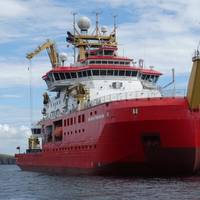
Britain's high-tech polar research ship RRS Sir David Attenborough is gearing up for its first Antarctic science cruise.Over the coming weeks, the crew and scientists on board the vessel will be carrying out a range of trials to test the ship's science equipment in both deep and shallow water around the Scottish coast. Among the tech to be tested are the vessel's moonpool, coring equipment and the ship’s workboat Erebus, all of which are critical elements of upcoming science missions.Erebus will be put through its paces with new equipment…
TECH FILE: Acoustic Tech Used to Understand Climate Change in the Arctic
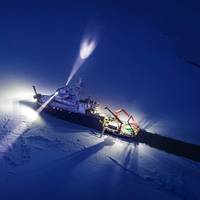
Major changes are occurring in the ocean. Climate change and subsequent melting sea ice are not necessarily good changes. Why are acoustic Doppler current profilers an invaluable tool to get a complete picture of the Arctic’s changing wave conditions in the context of climate change?In the Arctic, the end-of-summer sea ice extent in 2020 was the second-lowest in the last 42 years.“The ice used to melt out in June or July. Now it melts out in May. It used to come back in September or October.
Inmarsat, Space Norway to Launch Arctic Satellites

Inmarsat will introduce two new satellite payloads dedicated to the Arctic region in a partnership with Space Norway, and its subsidiary Space Norway HEOSAT.The new Global Xpress (GX) payloads support the rapidly growing demand among both commercial and government users for seamless, reliable, high-speed mobile broadband services in the Arctic and throughout the world. They specifically address rising demand for high-speed mobile broadband Fleet Xpress service capability from the merchant shipping…
Maersk Tests Russian Arctic Route
The Danish-flagged cargo ship Venta Maersk, owned by the world's biggest shipping group A.P. Moller-Maersk, has successfully passed through the Russian Arctic, in a trial voyage showing that melting sea ice could potentially open a new trade route from Europe to east Asia.Palle Laursen, the chief technical officer of A.P. Moller-Maersk saying that the cargo vessel has made the journey as a one-off trial. “The trial allowed us to gain exceptional operational experience, test vessel systems, crew capabilities and the functionality of the shore based support setup,” he said.Laursen said the ship, which had a cargo of frozen fish, arrived in St. Petersburg on Friday, after leaving Russia's Pacific port city of Vladivostok on Aug. 22.
Arctech Helsinki Shipyard Looks for New Investor as Sanctions Bite
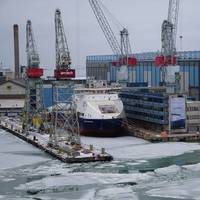
Russian state-owned United Shipbuilding Corporation (USC) is looking for a new owner for its Arctech Helsinki shipyard as sanctions against the holding company hamper business, the head of the shipyard said on Tuesday. The shipyard is the world’s biggest builder of vessels that can navigate ice-covered waters, and it has expected more orders as melting sea ice opens the Arctic to more shipping, mining and oil drilling. However, following the Ukraine crisis and back-to-back East-West sanctions, Russian ownership has complicated the shipyard’s access to finance.
Melting Sea Ice: A Canary in the Coal Mine
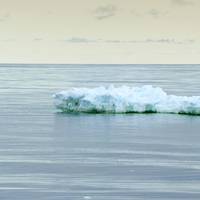
The rapid loss of Arctic sea ice is a sentinel. Most of us will never venture into the Arctic, but it can and does provide us with a forewarning of impacts coming to our parts of the Earth – and some of the most significant impacts will directly affect the maritime industry. In earlier times, coal miners were sometimes overcome by the buildup of odorless carbon monoxide gas. Some died as a consequence. Eventually it was realized that canaries were more susceptible to the gas than were humans.
China Eyes Faster Arctic Routes Opened by Global Warming
China will encourage ships flying its flag to take the Northwest Passage via the Arctic Ocean, a route opened up by global warming, to cut travel times between the Atlantic and Pacific oceans, a state-run newspaper said on Wednesday. China is increasingly active in the polar region, becoming one of the biggest mining investors in Greenland and agreeing to a free trade deal with Iceland. Shorter shipping routes across the Arctic Ocean would save Chinese companies time and money. For example, the journey from Shanghai to Hamburg via the Arctic route is 2,800 nautical miles shorter than going by the Suez Canal. China's Maritime Safety Administration this month released a guide offering detailed route guidance from the northern coast of North America to the northern Pacific…
US Coast Guard Moves Forward on New Icebreakers
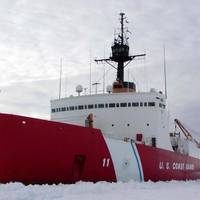
The U.S. Coast Guard released a proposed acquisition timeline and requirements for two new heavy U.S. icebreakers that could cost $1 billion each and said it would meet with interested companies during an industry day in March. Coast Guard Commandant Admiral Paul Zukunft told an event hosted by the Center for Strategic and International Studies that notice was intended to get information from companies about their ability to build and develop icebreakers that would be in use for 40 years and to explore options such as leasing.
Sanctioned Shipyard Hopes for Icebreaker Deals
On a sunny day on the Helsinki seafront, sparks fly from steel welding at the bustling Arctech shipyard, which seems insulated from Finland's economic recession as it strives to meet an order book that stretches into 2017. The world's biggest manufacturer of icebreakers, or ships that can navigate ice-covered waters, Arctech is poised to benefit from an expected flurry of activity in the Arctic, which is being reinforced by U.S. President Barack Obama's Arctic push. As climate change is melting sea ice and opening the Arctic to more shipping, mining and oil drilling, icebreakers will forge waterways for other ships, carry out rescue missions and do stand-by duties for oil platforms in the region.
Five Chinese Ships in Bering Sea as Obama Visits Alaska
Five Chinese Navy ships are sailing in international waters in the Bering Sea off Alaska, the Pentagon said on Wednesday, in an apparent first for China's military that came as U.S. President Barack Obama toured the U.S. state. Pentagon spokesman Captain Jeff Davis said it was the first time the United States had observed Chinese Navy ships in the Bering Sea. "We respect the freedom of all nations to operate military vessels in international waters in accordance with international law," Davis said. The appearance of the ships is an example of the expanding reach of China's navy and overlapped with a three-day visit by Obama to Alaska as part of his efforts to raise awareness about climate change. Two U.S.
Huntington Ingalls Cites Interest in Building US Icebreakers
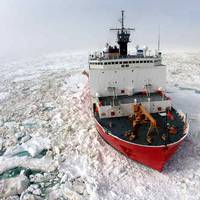
Huntington Ingalls Industries Inc, which builds aircraft carriers and U.S. Navy warships, on Tuesday said it was keen to bid to build new icebreakers for the U.S. Coast Guard, after President Barack Obama pushed for quicker work on the program. The company's Ingalls shipbuilding unit, based in Pascagoula, Miss., built the newest U.S. icebreaker in the U.S. fleet, the USCGC Healy, which was delivered in November 1999. Huntington Ingalls spokesman Bill Glenn said his company had…
Obama Pushes for US Icebreakers
President Barack Obama on Tuesday proposed a faster timetable for buying a new heavy icebreaker for the U.S. Arctic, where quickly melting sea ice has spurred more maritime traffic and the United States has fallen far behind Russian resources. The move, part of a push to convince Americans to support Obama's plans to curb climate change, has long been urged by Arctic advocates as climate change opens up the region to more shipping, mining and oil drilling. The announcement came as Obama heads to the coastal town of Seward, named after Secretary of State William Seward, who negotiated the purchase of Alaska in 1867 from Russia. In the first step of Obama's new timetable, the government would buy a heavy icebreaker by 2020 instead of the previous goal of 2022.
Russia, US Agree on Arctic Fishing Ban
Five nations set moratorium on fishing near North Pole; no fish there now, but thaw is drawing stocks north. The United States, Russia and other Arctic nations signed an agreement deal on Thursday to bar their fishing fleets from fast-thawing seas around the North Pole, an agreement delayed more than a year by tensions over Ukraine. The accord, also signed in Oslo by the ambassadors of Canada, Norway and Denmark, is a response to global warming, which is melting sea ice in the central Arctic Ocean, an area the size of the Mediterranean. The central Arctic probably has no commercial fish stocks now, experts say, but melting sea ice may draw fish such as cod farther north. Forty percent of the area was briefly open water when summer sea ice shrank to a record low in 2012.
Arctic Permafrost and Climate Gains
Carbon-rich Arctic soils are thawing, and that has the potential to undermine global climate policies, The Washington Post reports. Permafrost is basically soil that stays frozen all year long. Because it never melts, it holds thousands of years’ worth of dead plants and their carbon. About 24 percent of land in the Northern Hemisphere is covered with the stuff. Northern permafrost—ground frozen year-round—may contain more than twice as much carbon as there is in the atmosphere. And at least some of it could already be escaping to the atmosphere—as carbon dioxide or methane—as the Arctic warms. According to the National Academy of Sciences…
Melting Sea Ice Opens Arctic Passages for Invasive Species
For the first time in roughly 2 million years, melting Arctic sea ice is connecting the north Pacific and north Atlantic oceans. The newly opened passages leave both coasts and Arctic waters vulnerable to a large wave of invasive species, biologists from the Smithsonian Environmental Research Center assert in a commentary published in 'Nature Climate Change' and excerpted here. Two new shipping routes have opened in the Arctic: the Northwest Passage through Canada, and the Northern Sea Route, a 3000-mile stretch along the coasts of Russia and Norway connecting the Barents and Bering seas. While new opportunities for tapping Arctic natural resources and interoceanic trade are high, commercial ships often inadvertently carry invasive species.
Arctic Council Taking Regional Development Reins
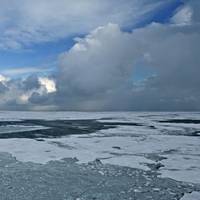
What was once a small group meeting to discuss scientific & technical cooperation has grown into a forum in which legally binding agreements between states are brokered. In the 16 years since the creation of the Arctic Council, both the physical environment of the Arctic and the level of international attention paid to this once-obscure forum have changed dramatically. At the Council's latest meeting in mid-May, in Kiruna, Sweden, ministers added new international observers, bolstered the Council's governance capacity and agreed on a common vision for the next 16 years…
Arctic Risk Management Study Released by DNV & FNI
A new study about crucial risk management issues relating to Arctic operations is released by DNV and the Fridtjof Nansen Institute (FNI). The study concludes that, in order to safely develop Arctic resources, there is a need for improved technology, oil spill preparedness and close cooperation between the authorities, industry and society. DNV’s CEO, Dr Henrik O. Madsen, presented the study entitled ‘Energy and the environment – Arctic resource development, risks and responsible management’ at the Offshore Northern Seas (ONS) Conference in Stavanger. Interest in the Arctic is growing rapidly, but there is no race for resources. The Arctic is more characterised by cooperation than by conflict.
Arctic Imperative Summit to Convene in Alaska
Recognizing the Arctic is changing rapidly the Summit convenes decision-makers on infrastructure investment, natural resources, policy and security. Rapid change in the Arctic due to melting sea ice brings new opportunities and challenges. To address the complex Arctic agenda, an influential mix of international, U.S. and local leaders will convene at the second Arctic Imperative Summit, August 24–27, 2012, in Anchorage and Girdwood, Alaska. With a mission to sharpen the world's focus on the short-term opportunities and long-term challenges of Arctic development, the Summit features a multidisciplinary group of experts. By engaging with decision-makers from all sectors, Arctic leaders will be in a stronger position to influence responsible development decisions on their shores.
Arctic Waters Hydrographic Survey by NOAA
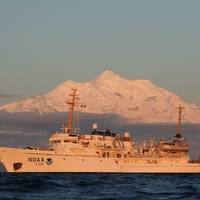
NOAA Ship 'Fairweather' to conduct hydrographic work in the Arctic updating depths measured in the 18th century. NOAA Ship Fairweather begins a 30-day survey mission in the Arctic, scheduled to check a sparsely measured 1,500-nautical mile coastal corridor from Dutch Harbor, Alaska, north through the Bering Strait and east to the Canadian border. The mission will collect needed information to determine NOAA’s future charting survey projects in the Arctic and will cover sea lanes that were last measured by Captain James Cook in 1778.
Outdated Artic Charts Serve As a Threat
According to cbsnews.com, Melting sea ice has drawn more cruise ship tourists to Canada's Arctic waters, but an Arctic security expert warns that centuries-old navigation charts still in use today could threaten the safety of such vessels and their passengers. Ships still rely on some maritime charts that date back to the voyages of the British Arctic explorer Sir John Franklin in the 1800s, said Rob Huebert, a political science professor at the University of Calgary. Navigational technology was limited in Franklin's time, Huebert said, leading to vague or inaccurate chart measurements. In August 1996, the Hanseatic cruise ship ran aground near Cambridge Bay, Nunavut, as it was carrying tourists in the Northwest Passage. No one was injured in that incident.





